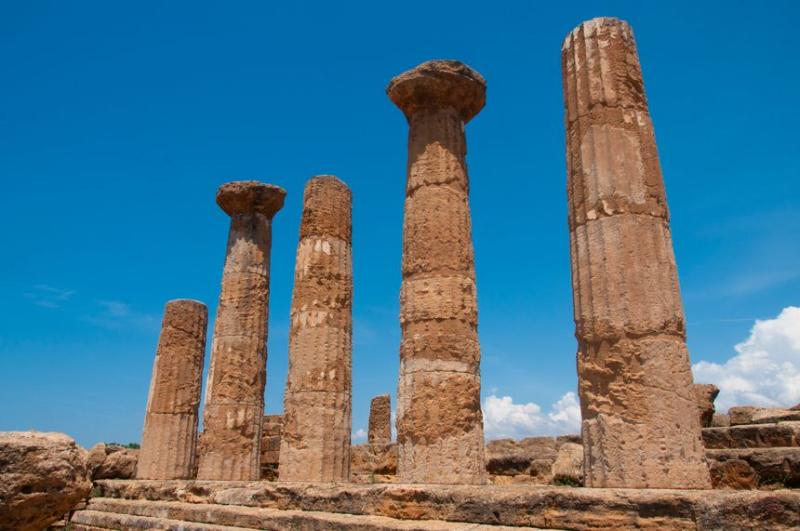‘The Dying Citizen’ Review: Keystone of the Republic
By: By Barton Swaim



In his 2001 book “Carnage and Culture,” Victor Davis Hanson sought to explain the West’s military superiority over the previous 2,500 years, from the democratic city-states of ancient Greece to the U.S. military of the late 20th century. Western martial dominance, he contended, sprang from cultural features: a tolerance for criticism, a propensity for technological innovation, and what we would now call a robust middle class—property-owning farmers and merchants who were neither wealthy overlords nor dependent peasants and who were therefore motivated to defend their homelands.
Mr. Hanson’s “The Dying Citizen” is a work of cultural analysis rather than history, but at its heart it is a warning about the enfeeblement of America’s middle class. The chief expression of “middleness” in the ancient world, Mr. Hanson argues, was citizenship: the idea that one bears privileges and obligations by virtue of belonging to a sovereign and geographically definable state. The postclassical idea of Western citizenship “ebbed and flowed through periods of retrenchment, oppression, and authoritarianism,” Mr. Hanson writes. “Nevertheless, it slowly evolved through the Middle Ages, Renaissance, Reformation, and Enlightenment toward an ever-greater array of rights.”
To put the point baldly, you don’t have political rights or equality under the law or even social welfare without a sturdy definition of citizenship. There was a time when even left-wing politicos grasped this point. Bernie Sanders himself once favored substantial checks on illegal entry into the U.S. for the excellent reason that you can’t pay for a massive American welfare state if every person on the globe can take advantage of it simply by walking into the country. Not anymore. During a Democratic presidential debate in 2019 (my example, not the author’s), 10 candidates were asked if they favored extending government health insurance to “undocumented immigrants”—that is, anybody, regardless of citizenship. All 10, including Mr. Sanders, raised their hands. Meaning, one was left to conclude, that the larger part of America’s credentialed elite no longer sees a difference between residents and citizens. “We should remember,” Mr. Hanson observes, “that the word ‘utopia’ derives from the Greek ou topos (a no place), not eu topos (a good place). When residents and citizens are equally Americans, then the place called America itself in a sense no longer exists.”
Mr. Hanson, an accomplished classicist and a senior fellow at the Hoover Institution, is one of the great amalgamators of American political writing. He has a particular gift for bringing together a dizzying array of events, controversies and ideas and making sense of them by advancing a coherent argument that incorporates thousands of years of history. In his latest work, Mr. Hanson distinguishes between citizens, on the one hand, and “precitizens” and “postcitizens,” on the other.
The “pre” and “post” prefixes refer not to historical chronology but to power. By precitizens he means the rootless and dependent, ancient and modern: Hellenic and medieval peasants at the mercy of landowners; modern victims of government welfare policy; working-class “clingers” whose patriotism Hollywood and the media routinely shame as racist; and the credulous young who’ve been taught to think of themselves not as citizens of a great nation but as, above all else, possessors of racial and sexual identities. By postcitizens he means the power brokers of all ages who seek the dilution of privileges conferred by citizenship. These include the imperialists, from Alexander the Great to the Soviets, who coerced people in faraway countries to behave according to alien mandates. But the 21st century has its own postcitizens, according to Mr. Hanson: anonymous bureaucrats whose authority to abridge the rights of citizenship is vast and often incontrovertible; lawless judges for whom the U.S. constitution “evolves” in tandem with their own political views; and transnational elites whose allegiances lie always with “humanity” or “the planet” and never with the country that enriched them.
Mr. Hanson hits hard, but I don’t find his analysis unfair or partisan. There is enormous value, moreover, in thinking about toxic political developments not as problems of the moment but as destructive pathologies to which all societies are prone at all times.
In the chapter titled “Unelected,” Mr. Hanson notes that there is nothng new about the administrative state. In the fourth century B.C., Mr. Hanson notes, Athenian democracy was far more complicated and bureaucratic than it had been a century before. The Great Palace of Constantinople in the sixth and seventh centuries; Versailles in the 17th and 18th centuries; the Vatican at all times—each housed a labyrinth of bureaucrats who worked the wills of whoever was nominally in charge; each, in other words, was run by a deep state.
A democratic republic, though, is supposed to be controlled by the people through their representatives, and the American republic very often isn’t. Mr. Hanson’s catalog of offenses is long and varied. He recalls, for example, an episode from 1983 when, as a raisin farmer in California, he realized that he couldn’t sell raisins to packagers at a profit because of a slump in the market. He and other farmers tried to sell their products directly to farmers’ markets but were swiftly informed that this was illegal—so decreed the Raisin Administrative Committee, an arm of the federal government created in 1947 to decide what percentage of raisin crops may be sold within the U.S. Thus does the administrative state tend to trample the property-owning middle-class merchants on whom democracies depend.
“Globalists” are another class of postcitizen. That word usually evokes denunciations of free trade, as if there were no costs attached to the protection of domestic manufacturing from superior and cheaper products from abroad. There are hints of that viewpoint here, but Mr. Hanson places the emphasis, wisely in my view, on asymmetrical trade with China, which has turned out to be not simply a competitor but a menace to U.S. national security.
The chapter on globalists is otherwise a brilliant account of radical and liberal attempts, from the French Revolution to Davos, to free the earth’s enlightened power brokers from local allegiances and make them Citizens of the World. “I have no country to fight for,” proclaimed the American socialist Eugene V. Debs; “my country is the earth; and I am a citizen of the world.”
The trouble with Citizens of the World is that they quickly become the dupes of foreign powers. The spectacle of American elites throughout 2020 making excuses for the Chinese government’s mendacity over the novel coronavirus, while at the same time heaping scorn on the American president for every real or perceived misstep, was enough to make an ordinary patriot despair of his country. Mr. Hanson quotes a remark by Bill Gates in which the Microsoft co-founder, in April 2020, claimed that it was “a distraction” even to discuss China’s responsibility for the virus, and that in fact “China did a lot of things right at the beginning.” Talk of Beijing’s responsibility may have been a “distraction for Microsoft,” writes Mr. Hanson, “but not for sheet-metal fabricators in Addison, Illinois, or Flint, Michigan, or bankrupt restaurant owners in Reno, Nevada.”
Mr. Hanson ends the book with a spirited essay recounting the 2020 election and positing the stakes for Americans’ rights and privileges. Some readers, recalling his book “The Case for Trump,” will roll their eyes. But the circumstances of 2021—a chaotic border, emboldened foreign enemies, a public-education establishment racked by anti-Americanism, middle-class wage gains wiped out by inflation—do not suggest that the Biden era has strengthened American citizenship.
—Mr. Swaim is an editorial-page writer for the Journal.




This is a book that I have read recently. I consider it one of the most important books written in the past decade. Victor Davis Hanson needs little introduction, but for those who don't know: Victor Davis Hanson is the Martin and Illie Anderson Senior Fellow in Residence in Classics and Military History at the Hoover Institution, Stanford University, a professor of Classics Emeritus at California State University.

"Most of human history is full of the stories of peasants, subjects, or tribes. The concept of the "citizen," an idea we take for granted, is historically quite rare - and was, until recently, amongst America's most profoundly cherished ideals"
The Book is:
The Dying Citizen: How Progressive Elites, Tribalism, and Globalization Are Destroying the Idea of America
By Victor Davis Hanson
Basic
432 pages
I have seen the book. It is nothing but a regurgitation of right wing talking points from the last 10 years or so. Hanson wants to ring the cash register again.
You haven't read it, yet you condemn it.
I skimmed through the contents of the book. It is largely a retelling of the past dozen years or so from a right wing perspective. I have online access to the book, as I do to many books.
Read it closely and educate yourself